The advantages of CRM systems are immense when you consider the impact it has on the company’s processes and customer relationships. However, as with any continuous business expenditure, it pays to perform your research and gain the real argumentations in numbers. Let’s outline 5 CRM statistics that can not only show you the figures and convince to invest in the platform but explain the influence it will have on your business in 2017.
#1 Enhanced CRM Growth
Being one of the most significant priorities in 2016, CRM systems continue to help the companies focus on the client retention and satisfaction. Besides, the evolvement of CRM industry has no signs of gearing down. In 2008, CRM market was forecasted to be worth about $18 billion by 2016.
The Gartner report states that the growth of CRM is expected to reach 37$ billion in 2017.
CRM software revenue forecast (millions of U.S. dollars)
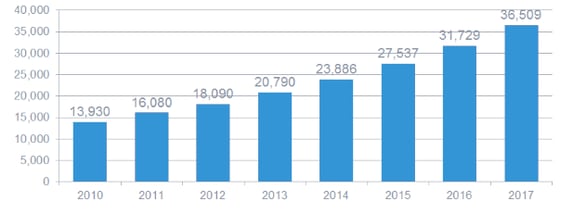
#2 Rise of Cloud Based CRM Usage
The increased demand to access CRM from the various devices and locations has led to the evolvement of cloud-based platforms. Only 12% of companies used these types of solutions. Today’s figure has moved up to 87%.
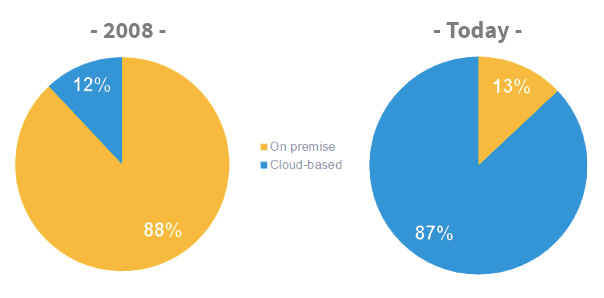
#3 Expansion of Mobile CRM
The enlargement of mobile software induced many organizations to implement mobile CRM platforms and observe better user adoption rates. CRM statistics indicates that mobile CRM access helps you boost the productivity of about 15%. Moreover, Innoppl Technologies investigation determined that 65% of reps who have adopted the mobile CRM have accomplished the sales quotas. While just 22% of the sales employees exploiting the non-mobile platform have achieved the same results.
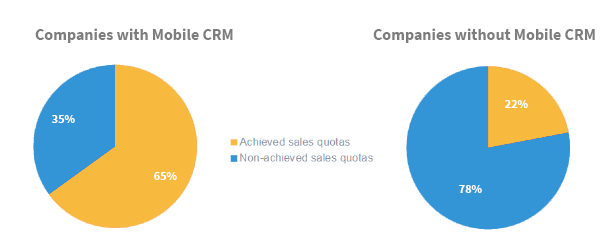
The Nucleus Research explored that the mobile CRM access enlarges the sales force productivity by an average of 14.6%. Besides, the further 3 in 10 mobile CRM users state the improvements by more than 20%.
Improved sales productivity from Mobile CRM
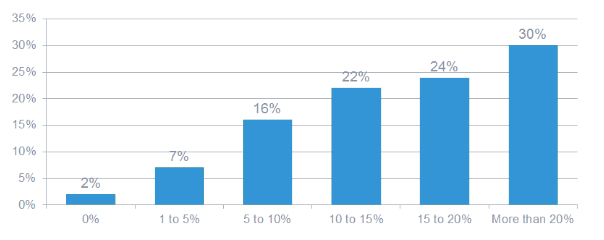
#4 Vital CRM Feature
A study by Inside CRM showed that 55% of users consider ease-of-use as the most significant and practical capability. For instance, companies prefer a platform that includes an intuitive interface, on-screen training, as well as tooltips.
Most important CRM feature
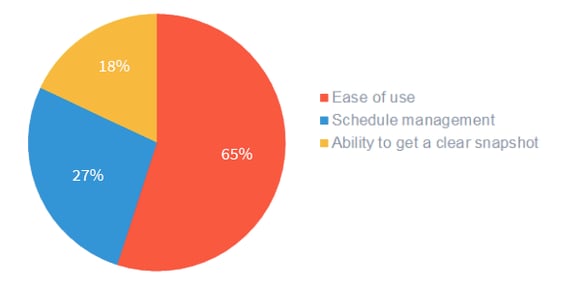
#5 CRM Use Cases
CRM is not only a system to store information about customers, but it is also a platform for managing the potential clients, determining their requirements, marketing relevant content, etc. This gives you an opportunity to get a 360-degree view of every prospect and close the deals faster. The Scribe Software reports that 6 out 10 of small businesses use the CRM systems for the email marketing.
CRM system use cases
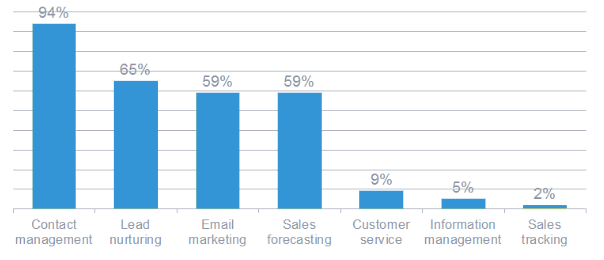
With that being said, a study by StrongView notes that 60% of companies are planning to increase the email marketing budget in 2017.
Which marketing programs do you plan to increase spending for
in the upcoming year?
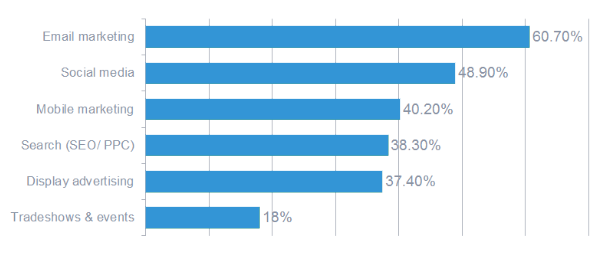
As you can see, the above-mentioned CRM statistics point towards 2017 being a year of the client due to the various reasons. In today’s world, the customers research the products or services online before making a purchase, and
87% of the prospects shop with the help of their mobile devices.
So, these CRM statistics provide you with the promising numbers for reaching business productivity. In case you have not invested in a platform yet or wanted to move your data from CSV files to CRM, take advantage of an automated migration service Trujay. The SaaS moves the records fast and accurately, as well as enables you with the following features:
- the service guarantees to treat information securely and offers you an opportunity to sign the Nondisclosure Agreement (NDA);
- an automated tool includes an opportunity to map the fields and users to fit the business requirements;
- Trujay allows you to run a free Demo Migration and observe if the service works properly;
- the SaaS has no impact on business processes, as well as assures the uptime of the current and future CRMs.
To Conclude
Knowing the CRM statistics and reports before implementing a platform is not just important, but crucial, as it can provide valuable insights into how the solution can truly benefit your company. By understanding the numbers and trends, you can make informed decisions that will have a significant impact on your business.
Implementing a CRM system is not just about streamlining your business processes and increasing efficiency. It goes beyond that. A well-implemented CRM system can actually drive revenue growth and improve overall team performance. By centralizing customer data, automating repetitive tasks, and providing valuable insights, a CRM system empowers your team to focus on what really matters - building and nurturing strong customer relationships.
If you want to try out a new CRM solution, you can do that by transferring some amount of your data into the desired CRM by running a free Demo Migration.
So, don’t wait any longer, start using a CRM platform right now!




